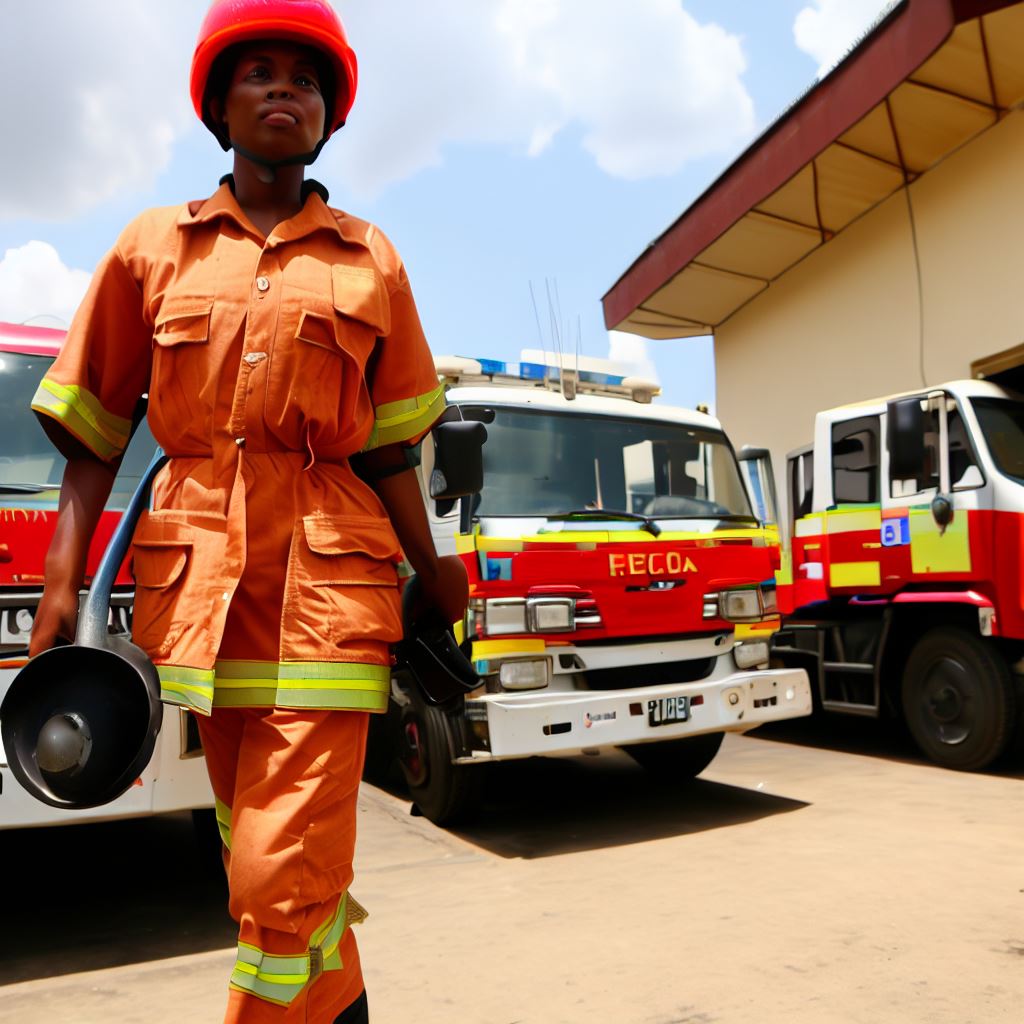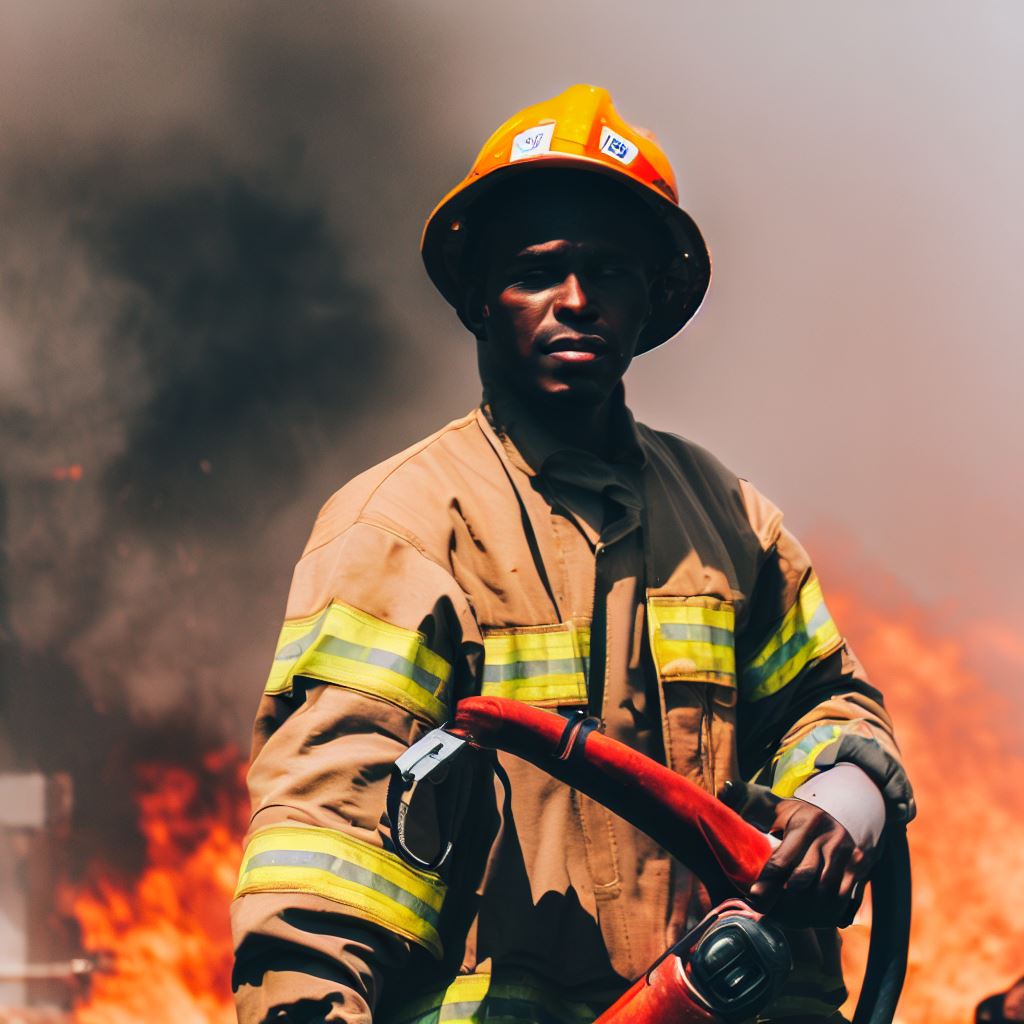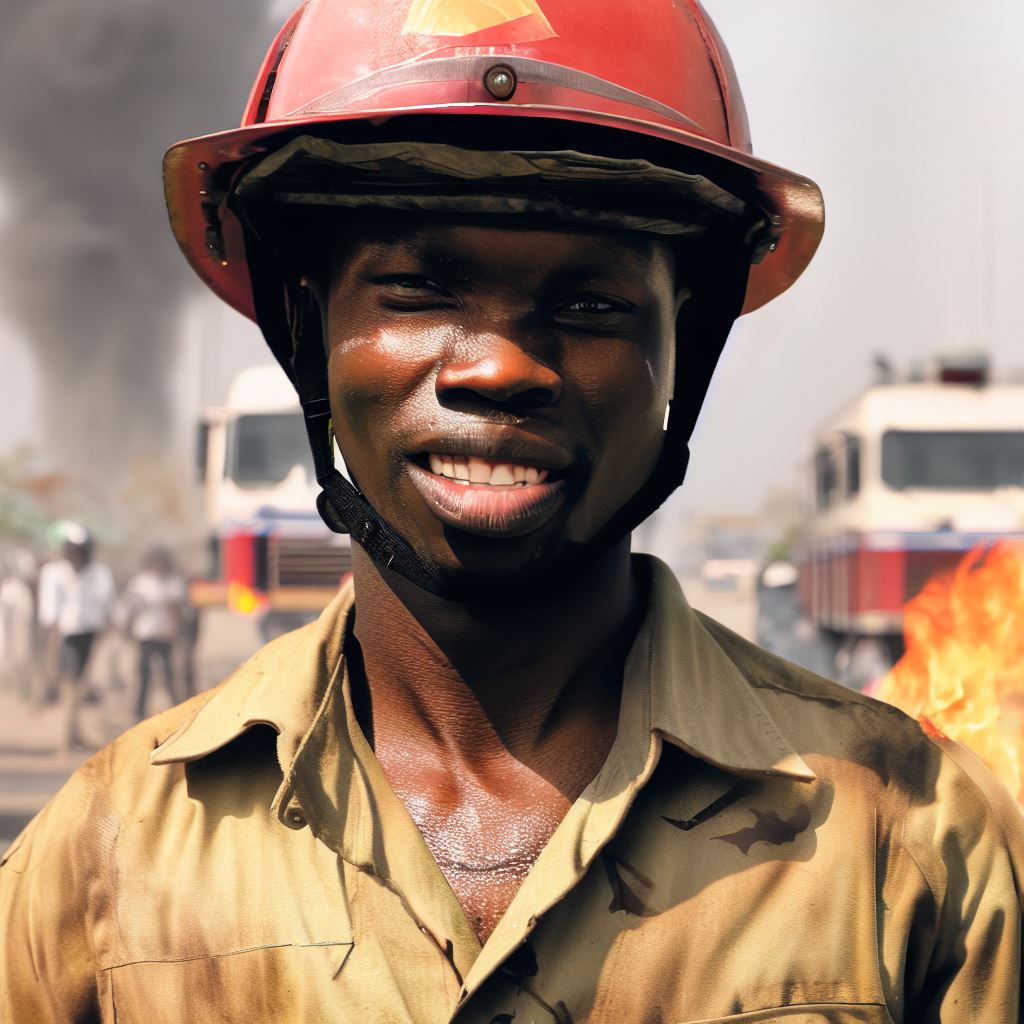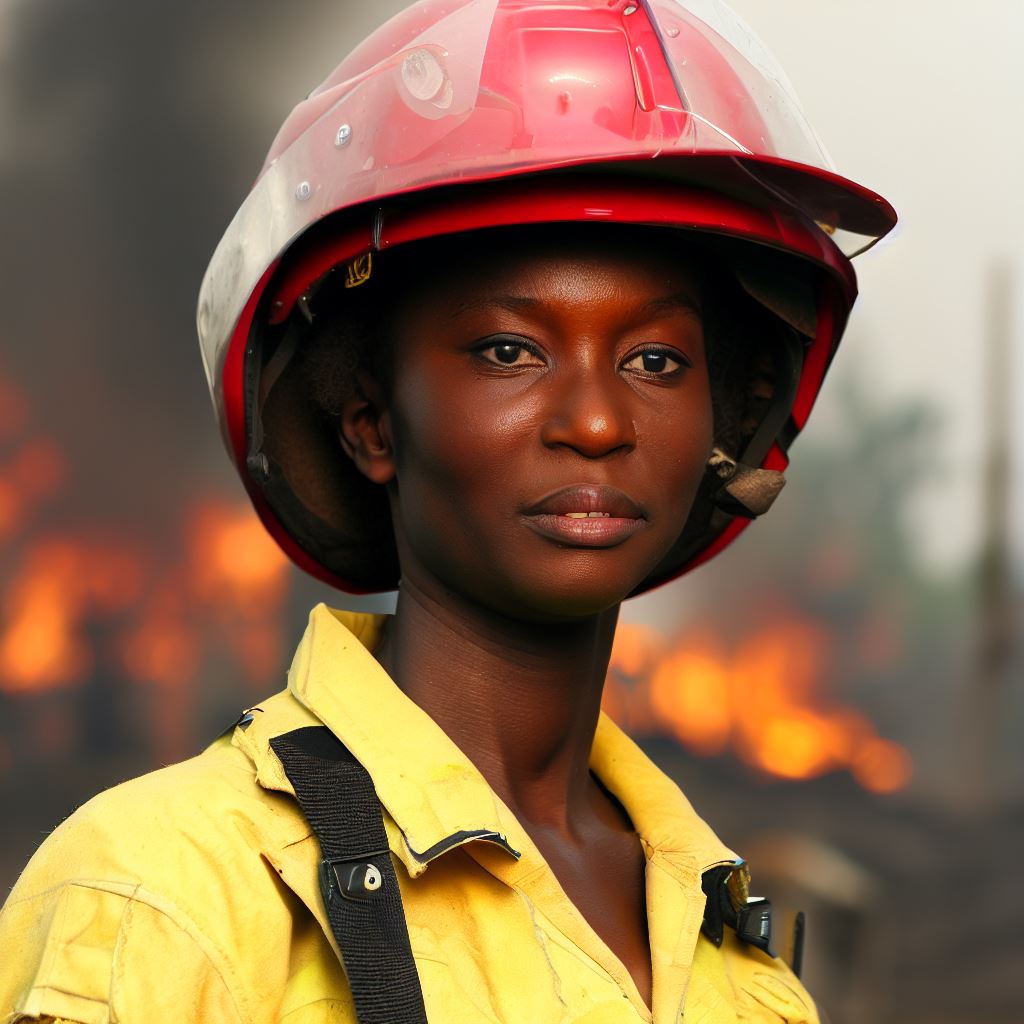Introduction
Nigeria, a country in West Africa known for its diverse culture and vibrant economy, also takes pride in its fire stations.
These stations are the unsung heroes that protect lives and properties during emergencies or fire outbreaks.
With Nigeria’s rapid urbanization and population growth, the importance of fire stations cannot be overstated.
Fire stations in Nigeria serve as the first line of defense in combating fires and other disasters.
Equipped with skilled firefighters, advanced equipment, and strategic locations, these stations work tirelessly to save lives and minimize damage.
They offer a range of services, from fire suppression and rescue operations to medical assistance during emergencies.
Inside the world of a Nigerian fire station, there is an organized hierarchy and structure.
Firefighters undergo rigorous training to prepare for various scenarios and emergencies they may face.
They work in shifts, providing 24/7 coverage to ensure rapid response times. Their dedication and bravery are commendable as they risk their lives to protect others.
Additionally, Nigeria’s fire stations also prioritize community outreach and education.
They conduct awareness programs, training sessions, and drills to educate the public on fire safety and prevention.
By fostering a culture of safety and preparedness, these fire stations contribute to building resilient communities across Nigeria.
In fact, Nigeria’s fire stations are vital institutions that safeguard the nation’s well-being by responding promptly to emergencies, preventing property loss, and saving lives.
This blog post will delve deeper into the world of Nigeria’s fire stations, shedding light on the incredible work they do day in and day out.
History and Development of Fire Stations in Nigeria
A. Historical background of fire stations in the country
- The history of fire stations in Nigeria dates back to the colonial era.
- Fire stations were initially established by the colonial authorities to protect their own properties.
- The first fire station in Nigeria was built in Lagos in 1865 during the British colonial rule.
- These early fire stations were small and basic, with limited equipment and manpower.
- As the country grew and urbanized, the need for more fire stations became apparent.
- The rapid industrialization and urban development in Nigeria further emphasized the importance of fire stations.
- Over time, fire stations evolved from basic structures to more sophisticated and well-equipped centers.
B. Factors contributing to the establishment and growth of fire stations
- The increasing population and urbanization played a significant role in the establishment of fire stations.
- The government recognized the need for fire stations to protect lives and properties in growing cities.
- Industrialization led to a rise in fire hazards, making the establishment of fire stations a necessity.
- The occurrence of major fires in the past highlighted the urgent need for better firefighting capabilities.
- Technological advancements in firefighting equipment and techniques contributed to the growth of fire stations.
- International best practices and experiences served as a benchmark for the development of fire stations in Nigeria.
C. Role of the government in the development of fire stations
- The Nigerian government plays a crucial role in the development and maintenance of fire stations.
- Government agencies are responsible for the funding, construction, and management of fire stations.
- Policies and regulations are formulated to ensure efficient functioning of fire stations.
D. Adoption of international standards and best practices
- Nigeria has adopted international standards for the design and construction of fire stations.
- Fire stations in the country follow best practices in terms of equipment, training, and operational procedures.
- Regular training programs are organized to update firefighters on the latest firefighting techniques.
- Collaboration with international firefighting agencies helps in adopting international best practices.
In review, the history and development of fire stations in Nigeria have evolved from basic structures to sophisticated centers.
The government recognized the importance of fire stations in protecting lives and properties, leading to their establishment and growth.
Factors such as urbanization, industrialization, and technological advancements have contributed to the expansion of fire stations.
The adoption of international standards and best practices ensures that Nigerian fire stations are equipped with the necessary resources and knowledge to effectively combat fires.
Infrastructure and Facilities
A. Overview of the physical infrastructure of fire stations
- Fire stations in Nigeria are typically large, well-built structures, strategically located in urban areas.
- They are constructed with fire-resistant materials to ensure the safety of firefighters and preserve equipment.
- The architecture of these stations is designed to facilitate quick navigation and response during emergencies.
- Adequate parking spaces are available to accommodate fire trucks and other emergency vehicles.
- Many fire stations also have helipads to enable air transport when necessary.
- The buildings are equipped with advanced alarm systems to ensure immediate response to fire calls.
B. Description of essential facilities and equipment
- Fire stations house dormitories to provide accommodation for firefighters during their shifts.
- There are communal areas for dining, relaxation, and conducting briefings.
- Training facilities, including classrooms and simulation rooms, are crucial for educating and preparing firefighters.
- Fire stations have specialized equipment such as fire engines, hydrants, hoses, and breathing apparatuses.
- Communication systems are in place to coordinate operations and receive emergency calls.
- Medical facilities and first aid equipment are available to provide immediate medical assistance to victims.
C. Technology integration and modernization efforts
- Nigerian fire stations have begun integrating modern technology into their operations.
- Computerized dispatch systems are used for efficient deployment of resources.
- GPS tracking is utilized to monitor the location of fire trucks and optimize response times.
- Thermal imaging cameras enable firefighters to locate victims and identify heat sources during rescue operations.
- Some fire stations have adopted drone technology to conduct aerial surveillance and assess the extent of the fire.
D. Challenges and limitations faced in maintaining infrastructure and updating facilities
- Limited funding and budget constraints often hinder the maintenance and upgrade of fire station infrastructure.
- Lack of skilled technicians and experts in fire station maintenance poses difficulties in resolving technical issues promptly.
- Bureaucratic processes and delays in procurement can impede the timely acquisition of necessary equipment and technology.
- Aging infrastructure requires regular inspections and repairs to ensure operational efficiency and firefighter safety.
- Inadequate power supply in certain areas disrupts the functioning of essential facilities and equipment.
E. Comparison with fire stations in other countries
- Fire stations in developed countries often have more advanced infrastructure and facilities compared to Nigeria.
- Developed countries prioritize continuous modernization, enabling quicker response times and enhanced safety.
- Some countries have fire stations specifically designed to handle hazardous materials incidents or large-scale disasters.
- Investment in state-of-the-art technology and equipment is higher in developed countries, giving them a competitive edge in firefighting capabilities.
- However, Nigerian fire stations demonstrate resilience and resourcefulness in managing emergencies with limited resources.
Overall, the physical infrastructure of Nigerian fire stations provides a suitable environment for firefighters to respond effectively to emergencies.
Despite facing challenges in maintaining and updating facilities, efforts to integrate technology and modernize operations are gradually taking place.
While there might be disparities when compared to fire stations in more developed countries, Nigerian fire stations strive to provide essential services and protect lives and property within their means.
Read: Hiring Now: Top Companies for Coating Technicians in Nigeria

Firefighters’ Training and Skill Development
A. Overview of the training programs for firefighters
Firefighters undergo rigorous training programs that cover various aspects of firefighting techniques and tactics.
B. Importance of continuous skill development
Continuous skill development is crucial for firefighters to stay updated with the latest techniques and equipment.
C. Specialized training for handling different types of emergencies
Firefighters receive specialized training to effectively handle various emergencies such as chemical spills, high-rise fires, and rescues.
D. Collaboration with international organizations for knowledge exchange
Fire departments in Nigeria collaborate with international organizations to exchange knowledge, learn new techniques, and share experiences.
E. Recognition and awards for outstanding firefighters
Outstanding firefighters are recognized and awarded for their exceptional bravery, courage, and dedication to their duties.
Nigeria Fire Stations stand as beacons of preparedness in the face of emergencies.
These unsung heroes undergo rigorous training, equipping themselves with a diverse skill set to tackle any challenge.
From understanding fire behavior to mastering specialized equipment, they leave no stone unturned.
Continuous skill development is their mantra, ensuring they keep abreast of the latest techniques and equipment.
Regular drills and exercises hone their abilities, readying them for the unexpected.
But it doesn’t end there. Nigeria’s firefighters receive specialized training for handling chemical spills, high-rise fires, vehicle extrications, and water rescues. Their adaptability shines in complex situations.
International collaborations broaden their horizons, enabling knowledge exchange, best practices sharing, and access to cutting-edge firefighting techniques.
Outstanding firefighters receive well-deserved recognition, motivating others to aim for excellence.
Nigeria Fire Stations invest in building a skilled and strong workforce, ready to face any emergency with unwavering proficiency.
Read: Tech Innovations in Coating: Nigeria’s Growing Landscape
Efficient Emergency Response Systems
A. Overview of the emergency response systems in place
- Nigeria’s fire stations play a crucial role in the country’s emergency response systems.
- They are equipped with trained firefighters, advanced equipment, and vehicles to handle emergencies.
- These stations are strategically located across the country to ensure quick response in any situation.
- The emergency response systems aim to protect lives, property, and the environment from fire disasters.
- Firefighters are on duty 24/7, ready to respond to any emergency calls they receive.
B. Quick response time and measures to improve it further
- Quick response time is vital in emergency situations, especially when dealing with fires.
- Nigeria’s fire stations have been working on improving their response time through various measures.
- They have implemented efficient communication systems to receive emergency calls and dispatch units promptly.
- Firefighters undergo regular training to enhance their skills and response time during critical situations.
- The use of modern technology and GPS systems in fire trucks enables them to reach the scene quickly.
C. Coordination with other emergency service providers
- Effective coordination between fire stations and other emergency service providers is crucial for an efficient response.
- Firefighters often collaborate with paramedics, police, and other agencies to handle complex emergencies.
- This coordination ensures a synchronized approach to emergency situations, minimizing response time and maximizing effectiveness.
D. Community engagement and awareness programs for better response
- Fire stations in Nigeria believe in the importance of community engagement for better emergency response.
- They actively organize awareness programs to educate the public about fire safety and prevention measures.
- These programs include seminars, workshops, and drills to train individuals on handling emergencies.
- The aim is to create a safety-conscious community that can respond effectively during fire incidents.
- Through community engagement, fire stations also gather valuable feedback and insights for further improvements.
In general, Nigeria’s fire stations have established efficient emergency response systems to protect lives and property.
They strive to achieve quick response times through improved communication systems and continuous training.
Collaborating with other emergency service providers ensures a coordinated approach, while community engagement programs create awareness and preparedness among the public.
These efforts contribute to a safer Nigeria and serve as a model for effective emergency response systems globally.
Read: Networking in Nigeria: Coating Technician Associations
Fire Prevention and Safety Measures
A. Overview of fire prevention campaigns and initiatives
- Fire prevention campaigns aim to raise awareness about fire hazards and ways to prevent them.
- These initiatives involve educating the public about fire safety practices and the importance of prevention.
- Fire prevention campaigns can include events, workshops, and media advertisements to reach a wider audience.
B. Public education and awareness programs on fire safety
- Public education programs focus on teaching individuals about the dangers of fires and how to stay safe.
- These programs provide information on fire extinguisher usage, evacuation procedures, and emergency contact details.
- Awareness programs aim to inform communities about fire risks specific to their area and the importance of preparedness.
C. Importance of fire safety regulations and inspections
- Fire safety regulations ensure that buildings comply with safety standards to prevent fire incidents.
- Inspections by fire safety officials help identify potential fire hazards and enforce compliance with regulations.
- Adhering to fire safety regulations reduces the risk of fire outbreaks and increases overall safety in buildings.
D. Challenges in enforcing fire safety measures
- Limited resources and manpower can make it challenging to enforce fire safety measures effectively.
- Lack of awareness and non-compliance from the public and businesses pose hurdles in ensuring safety.
- Poor infrastructure and inadequate fire protection systems can make it difficult to prevent and control fires.
E. Success stories and achievements in reducing fire incidents
- Implementation of fire safety measures has led to a significant reduction in fire incidents in Nigeria.
- Collaborative efforts between fire departments, government agencies, and communities have been successful in minimizing risks.
- Continuous monitoring, timely inspections, and stricter enforcement of fire safety regulations have contributed to improved fire prevention.
In short, fire prevention and safety measures play a crucial role in safeguarding lives and properties.
Effective fire prevention campaigns, public education programs, and strict enforcement of fire safety regulations are vital in reducing fire incidents.
Despite the challenges faced in enforcement and compliance, success stories in Nigeria demonstrate the positive impact of these measures.
Continued efforts in raising awareness and implementing safety measures will contribute to a safer environment for all.
Read: Safety First: Health Protocols for Coating Techs in Nigeria
Challenges Faced by Nigeria’s Fire Stations
A. Lack of adequate funding and resources
One of the major challenges faced by Nigeria’s fire stations is the lack of adequate funding and resources.
Fire stations require sufficient financial support to maintain their operations and upgrade their equipment.
B. Insufficient manpower and staffing issues
Another challenge is the lack of manpower and staffing issues.
Many fire stations in Nigeria are understaffed, which hinders their efficiency in responding to fire emergencies.
It becomes crucial to recruit and train more firefighters to address this issue.
C. Maintenance and repair challenges
The maintenance and repair challenges faced by Nigeria’s fire stations also contribute to their inefficiency.
Due to limited resources, fire stations struggle to keep their equipment and vehicles in optimal working condition.
Regular maintenance and timely repairs are essential to ensure their functionality.
D. Need for improved interagency cooperation
Effective interagency cooperation is vital for efficient firefighting operations.
In Nigeria, there is a need for improved coordination and collaboration between different agencies involved in emergency response, including the fire service, police, and paramedics.
E. Suggestions for overcoming these challenges
1. Increase funding and allocation of resources
The government must prioritize the allocation of adequate funds and resources to the fire service.
This will enable fire stations to procure modern equipment, upgrade facilities, and enhance overall operational capabilities.
2. Enhance recruitment and training programs
To address the manpower shortage, fire stations should conduct more recruitment drives and develop comprehensive training programs.
Properly trained firefighters can handle emergencies efficiently.
3. Establish maintenance and repair protocols
Fire stations should establish regular maintenance and repair protocols to ensure that their equipment and vehicles are in good working condition.
This will prevent breakdowns during critical operations.
4. Promote interagency collaboration and communication
The government should foster improved cooperation and communication among different emergency response agencies.
Regular joint training exercises and sharing of resources can enhance overall effectiveness.
5. Strengthen public awareness and education
The fire service should conduct public awareness campaigns to educate the population about fire safety measures.
This can help reduce the number of fire incidents and enable fire stations to focus on more critical emergencies.
Conclusion
A. Recap of the main points discussed
Throughout this blog post, we explored Nigeria’s fire stations and gained insight into their world.
We learned about the challenges they face, the equipment they use, and their commitment to saving lives and property.
B. Emphasis on the critical role of fire stations in Nigeria
Fire stations in Nigeria play a critical role in ensuring the safety and well-being of the people.
They are the first line of defense in emergencies, risking their lives to protect others. Without them, the impact of fires and other disasters would be catastrophic.
C. Call to support and appreciate the efforts of firefighters in the country
It is crucial for us to show support and appreciation for the tireless efforts of firefighters in Nigeria. Their bravery and dedication deserve recognition.
We can do our part by advocating for better resources, training, and support for these heroes.
Fires can strike at any moment, and being prepared is vital.
By understanding the realities and challenges faced by Nigeria’s fire stations, we can take steps to prevent fires and support the firefighters who put their lives on the line for us.
Let us stand together as a community, recognizing the immense value of fire stations and the selfless firefighters who protect our lives and properties.
It is time to give them the recognition they deserve and provide the necessary support to ensure their continued success.




